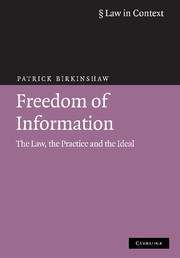Book contents
- Frontmatter
- Contents
- Preface
- Table of statutes
- Table of cases
- Introduction
- 1 Persistent themes and novel problems
- 2 Information and national security
- 3 Government and information: a historical development
- 4 The Freedom of Information Act 2000
- 5 The exemptions
- 6 Decisions and Appeals on FOI Exemptions
- 7 Access to environmental information
- 8 Privacy, access and data protection
- 9 Claims and counterclaims
- 10 Secrecy and access in the European Union
- 11 Openness, information and the courts
- 12 Freedom of information: overseas experience
- 13 Conclusion
- Index
8 - Privacy, access and data protection
Published online by Cambridge University Press: 05 June 2012
- Frontmatter
- Contents
- Preface
- Table of statutes
- Table of cases
- Introduction
- 1 Persistent themes and novel problems
- 2 Information and national security
- 3 Government and information: a historical development
- 4 The Freedom of Information Act 2000
- 5 The exemptions
- 6 Decisions and Appeals on FOI Exemptions
- 7 Access to environmental information
- 8 Privacy, access and data protection
- 9 Claims and counterclaims
- 10 Secrecy and access in the European Union
- 11 Openness, information and the courts
- 12 Freedom of information: overseas experience
- 13 Conclusion
- Index
Summary
The surveillance society
‘I'll be watching you’ is the motto of the twenty-first century. It is a familiar refrain but as we saw in chapter 1, the past lacked today's technology. In a report in January 2009, the House of Lords Constitution Committee reported on the extent of surveillance in the UK. The following examples were provided (and see pp. 323–41). The National DNA Database (NDNAD) was being expanded and contains ‘millions of samples’, new databases for a variety of public services were being introduced or developed, and there was a steady increase in the use of CCTV in both the public and private sector. There has been a profound and continuous expansion in the surveillance apparatus of both the state and the private sector. Today, computer databases and data-sharing, the monitoring of electronic communications, electronic identification, and public-area CCTV surveillance are ubiquitous and exert an influence over many aspects of our everyday lives. ‘The expansion in the use of surveillance represents one of the most significant changes in the life of the nation since the end of the Second World War, and has been shaped by a succession of governments, public bodies, and private organisations’ (para. 3). Widespread surveillance, whether collective or targeted, can be used for unjustifiably discriminatory purposes, it reported. A super database run by a private contractor tracking all phone and internet communications is planned to be operational by 2009.
- Type
- Chapter
- Information
- Freedom of InformationThe Law, the Practice and the Ideal, pp. 271 - 316Publisher: Cambridge University PressPrint publication year: 2010

